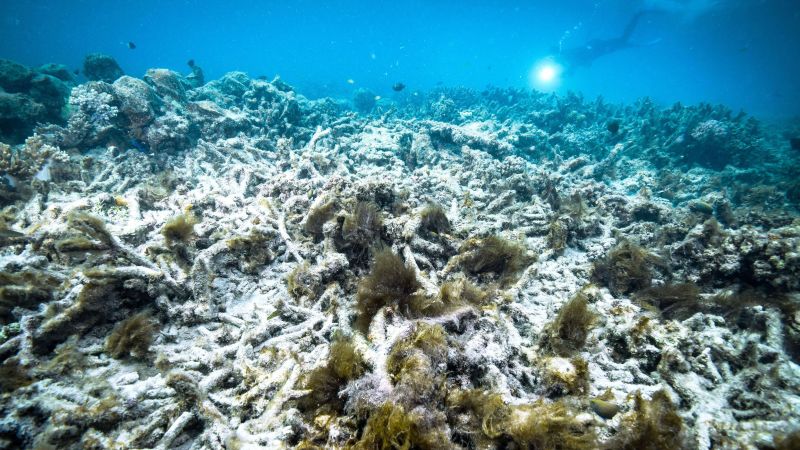
CNN
–
After conducting a mission to the world’s largest coral reef system, a team of scientists has concluded that the Great Barrier Reef should be added to its list of World Heritage Sites “in danger”.
In a new UN-backed report released on Monday, scientists said coral reefs face significant threats due to the climate crisis and that action to save them must be taken “with the utmost urgency.”
“The mission team concluded that the property faces significant threats that could have adverse effects on its inherent properties, and therefore meets the criteria for inclusion in the List of World Heritage in Danger,” the report said.
The 10-day monitoring mission by UNESCO scientists in March came months after the World Heritage Committee’s announcement Initial recommendation for listing Australia’s Great Barrier Reef as being “in danger” due to the accelerating effects of human-caused climate change.
At the time, the agency called on Australia to address “urgently” the mounting threats of the climate crisis, but received immediate opposition from the Australian government under former prime minister Scott Morrison.
The long-awaited final mission report outlines key steps that scientists say need to be taken urgently, although the report itself was published after a six-month delay. Originally scheduled for release in May before the UNESCO World Heritage Committee meets in Russia, the report has been delayed due to the ongoing war in Ukraine.
Recommendations include reducing greenhouse gas emissions, re-evaluating proposed projects and credit schemes, and ultimately increasing financial resources to protect coral reefs.
Australian Environment Minister Tanya Plebersek said at a press conference on Tuesday that the UNESCO report unfairly shines a spotlight on the Great Barrier Reef.
“Yes, climate change is a risk to ecosystems such as the Great Barrier Reef, but that means it is a risk to every coral reef globally,” Plebersk said. “There is no need to single out the Great Barrier Reef in this way.”
Spanning approximately 133,000 square miles and home to more than 1,500 species of fish and more than 400 species of hard corals, the Great Barrier Reef is a critically important marine ecosystem on Earth.
It also contributes $4.8 billion annually to the Australian economy and supports 64,000 jobs in tourism, fishing and research, according to the Great Barrier Reef Foundation.
But as the planet continues to warm, due to the increasing amount of greenhouse gases in the atmosphere, the long-term survival of coral reefs has come into question. Ocean warming and ocean acidification caused by the climate crisis has led to widespread coral bleaching. last year, Scientists found The global extent of living coral reefs has decreased by half since 1950 due to climate change, overfishing and pollution.
The outlook is similarly bleak, with scientists projecting that about 70% to 90% of all living coral reefs around the world It will disappear in the next 20 years. The Great Barrier Reef, in particular, has suffered several devastating mass bleaching events since 2015, caused by extremely hot ocean temperatures generated by the burning of fossil fuels such as coal, oil and gas.
During UNESCO monitoring expeditions, coral reef managers have found the Great Barrier Reef to suffer The sixth mass bleaching event due to heat stress caused by climate change. Aerial surveys of about 750 corals show widespread bleaching across the reef, with the heaviest bleaching observed in the northern and central regions.
Bleaching occurs when stressed corals are deprived of their food source. As conditions deteriorate, corals can starve and die, turning white when their carbonaceous skeleton is exposed.
“Even the strongest corals require nearly a decade to recover,” Judy Romer, an associate professor of marine biology at James Cook University in Townsville, previously told CNN. “So we’re really missing out on this recovery period. We’re getting back-to-back bleaching events, back-to-back heat waves. And the corals just aren’t adjusting to these new conditions.”
Weeks before the mission, the world’s scientists were working with the United Nations’ Intergovernmental Panel on Climate Change A disturbing report has been issued He concluded that with each extreme warming event, the planet’s vital ecosystems such as the Great Barrier Reef are pushed toward tipping points beyond which irreversible changes can occur.
When researchers on the expedition assessed the dire state of one of the Seven Natural Wonders of the World, they witnessed how the climate crisis has drastically altered the coral reef system.
After the report was published, Professor Leslie Hughes of the Climate Council said limiting global warming to 1.5°C along with “deep and rapid reductions in emissions this decade” are necessary to give coral reefs “a chance to fight back.””
The World Heritage Committee will make a decision on whether the reef should be formally classified as “in danger” next year, once UNESCO compiles a more comprehensive report that includes responses from the Australian federal and state governments.




More Stories
Journalists convicted in Hong Kong sedition case
Stand News: Hong Kong journalists convicted of sedition in case critics say highlights erosion of press freedom
Shark decapitates teen off Jamaica coast